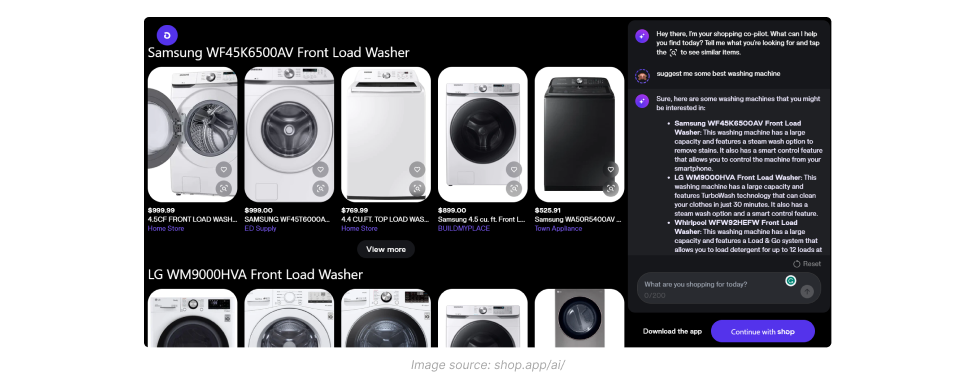As we move into 2023, it’s becoming increasingly clear that the use of artificial intelligence (AI) is transforming eCommerce in significant ways. One particular AI technology that is raising ears is ChatGPT for eCommerce, a powerful language model that is capable of generating human-like responses. In this article, we’ll take a look at the many ways in which ChatGPT is driving eCommerce into a new era.

Improving Customer Experience
Personalized Recommendations
By analyzing customer behavior and preferences, ChatGPT can generate tailored product recommendations that are more likely to result in a purchase. Personalized recommendations are particularly useful in the fashion industry, where customers often need help finding the right size or style. With ChatGPT, customers can get recommendations based on their size, preferred style, and even their past purchases. This not only saves the customer time but also makes them feel valued and understood, which can lead to greater customer loyalty in the long run.

Real-time Customer Support
Traditionally, eCommerce companies have relied on chatbots or customer service representatives to handle customer queries and issues. However, ChatGPT takes this to the next level by providing more natural and conversational responses that feel more like real human interaction. ChatGPT can answer questions about product specifications or availability, and even help customers complete their purchases. This not only improves the customer experience but also helps eCommerce companies to save time and resources by automating customer support processes.
Improved Search Functionality

With its natural language processing capabilities, ChatGPT can understand search queries more intuitively and provide more accurate results. This means that customers can find what they are looking for more quickly and easily, even if they are not familiar with the technical terminology. This functionality could be particularly useful in industries such as electronics or home goods, where customers may be looking for specific technical specifications or features. leading to increased sales and customer satisfaction.
Streamlining Operations

Automated Customer Service
With ChatGPT, eCommerce companies can automate customer service processes such as order tracking, returns, and refunds, eliminating the need for customers to wait on hold or navigate through a complex automated phone system. This reduces the workload for customer service representatives and allows them to focus on more complex issues that require human intervention.
Order Processing and Tracking
Customers can receive real-time updates on their orders from ChatGPT, including details on shipping and delivery. Customers can modify their orders with just a couple of ChatGPT interactions. This not only saves time and money but also makes eCommerce operations more effective.
Inventory Management
ChatGPT can analyze customer behavior and preferences to help eCommerce companies optimize their inventory management strategies. This not only helps to reduce costs but also ensures that customers can find the products they want when they want them.
ChatGPT can provide eCommerce companies with real-time insights into customer demand and inventory levels. This allows eCommerce companies to adjust their inventory levels and product offerings to better meet customer needs.
Moreover, ChatGPT can help eCommerce companies to identify slow-moving products or overstocked items, allowing them to make more informed decisions about pricing and promotions.
Boosting Sales
Increased Conversions through Personalized Marketing
ChatGPT for eCommerce is transforming operations by providing companies with the ability to personalize marketing messages to individual customers. ChatGPT can analyze customer behavior and preferences to generate targeted marketing messages that are more likely to result in a purchase. It sends personalized product recommendations based on a customer’s browsing history and previous purchases.
Additionally, ChatGPT can analyze customer responses to marketing messages to adjust and improve future campaigns. This not only increases conversions and sales but also improves the overall customer experience by providing customers with relevant and valuable information.
Reduced Cart Abandonment Rates
Cart abandonment is a major challenge for eCommerce companies, but with its real-time customer support capabilities, ChatGPT can engage with customers who are in the process of abandoning their carts and provide them with personalized support to help them complete their purchases.

For example, ChatGPT can send customers automated messages with personalized incentives such as discounts or free shipping to encourage them to complete their purchases. This will reduce cart abandonment rates significantly.
Upselling and Cross-selling Opportunities
Upselling and cross-selling are critical strategies for eCommerce companies. ChatGPT can suggest related or complementary products based on a customer’s current purchase or browsing history. It is also capable of suggesting product upgrades or premium options that are tailored to a customer’s specific needs and preferences. This not only helps eCommerce companies to increase sales but also provides customers with a more personalized and valuable experience.
Insights from ChatGPT and eCommerce Alliance
Metrics and Data Demonstrating the Impact of ChatGPT on eCommerce Sales and Operations
Some significant metrics and data show how ChatGPT technology affects eCommerce operations and sales. Businesses could save $8 billion annually by using chatbots and virtual assistants, according to a Juniper Research study. Additionally, according to a Gartner study, virtual customer assistants like ChatGPT are predicted to handle 40% of customer interactions by 2023.
The key metrics of customer engagement, conversions, and customer satisfaction have all significantly increased for eCommerce businesses that have implemented ChatGPT technology. For instance, after implementing their chatbot, H&M reported a 70% increase in click-through rates and a 20% increase in conversions.
Challenges and Limitations
Discussion of Potential Issues with ChatGPT Technology
Although ChatGPT technology is revolutionizing eCommerce operations, the technology’s precision and dependability could be a problem. Even though ChatGPT is made to comprehend natural language and give accurate answers, mistakes or misinterpretations are always possible and may result in an unhappy customer experience.
The expense of implementing ChatGPT technology is another potential problem. While the technology can benefit eCommerce businesses greatly, it may also necessitate a sizable investment in hardware, software, and staff. Before making a choice, eCommerce businesses should carefully weigh the advantages and disadvantages of implementing ChatGPT technology.
Consideration of Ethical Concerns
As with any technology, eCommerce businesses should take legal concerns into account before integrating ChatGPT. The potential for data privacy violations is one issue. For personalized recommendations and support, ChatGPT technology depends on a lot of customer data, which could cause privacy issues if the data is not adequately protected.
Conclusion
In conclusion, ChatGPT technology is transforming eCommerce operations in 2023 by providing eCommerce companies with a range of benefits, including personalized recommendations, real-time customer support, improved search functionality, automated customer service, order processing and tracking, and inventory management. ChatGPT technology can also increase conversions through personalized marketing, reduce cart abandonment rates, and provide upselling and cross-selling opportunities. However, eCommerce companies should consider potential issues with the technology, including accuracy and reliability, cost, and ethical concerns such as data privacy and algorithm bias.
Future development and improvements are needed to fully realize the potential of ChatGPT technology in eCommerce operations, including improving accuracy and reliability, integrating with existing systems and platforms, and addressing ethical considerations. Overall, ChatGPT technology has the potential to revolutionize eCommerce operations and provide a more personalized and efficient customer experience.
FAQs
How do I use ChatGPT in eCommerce?
Businesses can use ChatGPT in eCommerce to interact with customers and offer tailored recommendations, real-time support, and improved search functionality. Businesses can implement chatbots or virtual assistants on their websites or social media channels.
How does a Chatbot help with eCommerce?
Chatbots can help eCommerce businesses by providing 24/7 customer support, reducing response times, and improving the overall customer experience by providing personalized recommendations and assisting with purchasing decisions.
What are ChatGPT prompts for eCommerce?
ChatGPT prompts for eCommerce can include personalized product recommendations based on customer preferences and purchase history Providing real-time support for order tracking and processing, and upselling or cross-selling opportunities.
What are Chatbots in eCommerce?
Chatbots in eCommerce are conversational AI bots that allow businesses to interact with customers through a chat-based interface, providing personalized support and recommendations to improve the customer experience and drive sales.

Chirag Bhavsar Founder & CEO, Coduzion
Chirag Bhavsar is Founder and CEO at Coduzion. Gusty, Passionate, and a Sports freak. Loves to spend time reading financial books and playing outdoor games as soon as He is away from his desk. He always loves to take on new challenges and get good at them.











